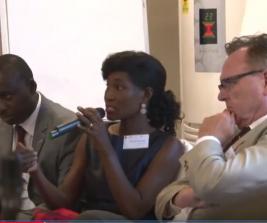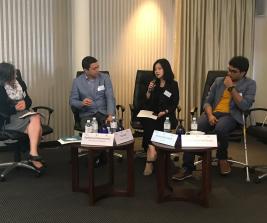Personal Story: How Microinsurance has helped Luiza
"He was our anchor, the one who kept everything together”. These are the words of Luiza, a housewife living with her husband, mother and two teenage sons in the low-income neighbourhood of Nilopolis on the northern Janeiro. The family had just returned from a holiday visiting family, with only R$4 (~US$2) left on their names, when disaster struck. Unexpectedly, Luiza’s father died. Though he had had some health problems from time to time, he had refused to go to a doctor and his death had come as a big shock to the family. A few months after his death, they are still coming to terms with it.
Luiza’s husband is a bus driver. He was a favourite with his father in law, “as his own son”. He works two shifts a day to give his family all the opportunities he possibly can. This is attested by the neat house and furniture. Yet they are worried about the education and future of their two sons, aged 17 and 11. “They are very lazy, that’s a problem”. Functional illiteracy in Brazil is around 25% and education remains one of the government’s biggest challenges.
Earning slightly more than R$1000 (~$555) per month, the family is not rich, but are gradually building up their assets. Luiza and her mother add to the f income by selling ice lollies out of the house. On Sundays, his day off, Luiza’s husband constructs a second storey to their house, which he built himself on the same plot at the back of his parents in law’s house. He also built a roof terrace featuring a built-in “churrasco” (barbeque) pride for the family. But all of this can be put at risk by a financial shock. Short Story Microinsurance in Brazil “He was our anchor, the one who kept everything together”. These are the words of Luiza, a housewife living with her husband, mother and two teenage sons in income neighbourhood of Nilopolis on the northern outskirts of Rio de Janeiro. The family had just returned from a holiday visiting family, with only R$4 (~US$2) left on their names, when disaster struck. Unexpectedly, Luiza’s father died. Though he had had some health problems from time to time, he had refused to go to a doctor and his death had come as a big shock to the family. A few months after his death, they are still coming to terms with it. Luiza’s husband is a bus driver. He was a favourite with his father in law, “like his shifts a day to give his family all the opportunities he possibly can. This is attested by the neat house and furniture. Yet they are worried about the education and future of their two sons, aged 17 and 11. “They are very lazy, that’s a problem”. Functional illiteracy in Brazil is around 25% and education remains one of the government’s biggest challenges. Earning slightly more than R$1000 (~$555) per month, the family is not rich, but are gradually building up their assets. Luiza and her mother add to the f income by selling ice lollies out of the house. On Sundays, his day off, Luiza’s husband constructs a second storey to their house, which he built himself on the same plot at the back of his parents in law’s house. He also built a roof terrace in “churrasco” (barbeque) – his sanctuary and a source of great pride for the family. But all of this can be put at risk by a financial shock. “
Therefore Luiza was all the more thankful that she had decided a couple of months before to take out a funeral insurance policy and add her parents. Though she was initially suspicious of insurance and doubted her ability to maintain regular monthly premiums, her aunt told her about the benefits of insurance. When, a few days later, an insurance agent showed up at her doorstep, she decided to take out funeral cover – a step she now regards as “sent from above”. Different levels of cover are offered: from R$12.50 (~$6) per month for funeral benefits only, to around R$30 ($15) per month, which also includes an income replacement component in the form of a monthly payment for a number of months in the event of a personal accident. Luiza had a very positive claims experience: “all we had to do was cry” – the rest was all taken care of. As a result, she has maintained her funeral policy and is now an active advocate for insurance in her community. She describes the agent, who still contacts her from time to time, as “an angel”.
This underlines the importance of claims and word of mouth for building the value proposition of insurance. It also highlights the importance of face to face contact between clients and agents.








